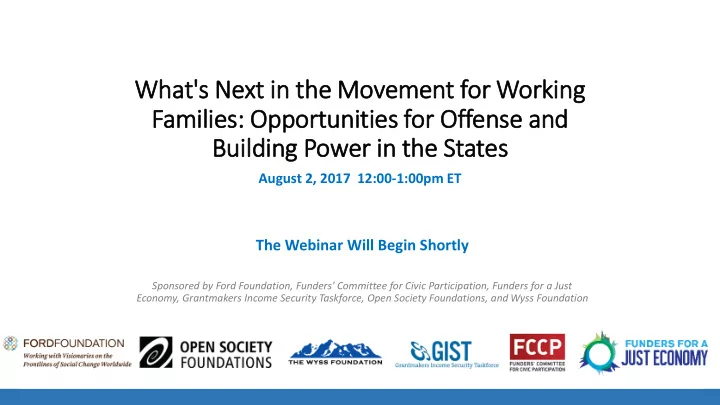

What's Next in in th the Movement for Working Families: Opportunities for Offense and Building Power in in th the States August 2, 2017 12:00-1:00pm ET The Webinar Will Begin Shortly Sponsored by Ford Foundation, Funders' Committee for Civic Participation, Funders for a Just Economy, Grantmakers Income Security Taskforce, Open Society Foundations, and Wyss Foundation
Webinar Logistics Overview • This webinar is being recorded. • The audience will be on “listen only mode.” • Use the “chat function” on your screen to ask a question.
Enter questions here!
What’s Next in the Movement for Working Families: Opportunities for Offense and Building Power in the States From Oregon to New York City - Winning a Family-Sustaining Workweek
Emma Oppenheim OPEN SOCIETY FOUNDATIONS
Welcome and Overview The growing movement for a fair workweek: • Unprecedented policy momentum including this year's historic state-wide win in Oregon and victories in six cities • Powerful worker-led campaigns that moved the retail sector to end on-call scheduling and show the path to creating good jobs in retail • Innovative strategies to amplify the voice of the service sector workforce in their workplaces, with policymakers, and at the ballot box in important cities and states across the country.
Speakers • Carrie Gleason, The Fair Workweek Initiative at the Center for Popular Democracy • Jeff Anderson, UFCW Local 555 & Working Families • Gordon Mar, Jobs with Justice • Greg Noth, Wyss Foundation
Carrie Gleason CENTER FOR POPULAR DEMOCRACY – FAIR WORKWEEK INITIATIVE
A Workweek We Can Count On The majority of working Americans are paid by the hour: 75 million or three in five people. Work we can Control over our A voice in how much count on personal lives and when we work
Insecurity and Instability in Today’s Workweek Hourly workers face…. Underemployment 50% want more hours 1 Err rratic Hours 38% experience fluctuating hours 1 Las Last-min inute Sc Schedule les 27% have same day scheduling changes 1 La Lack of of Fle Flexib ibili ility 50% have no say in their work schedule 2 Ge Gender an and rac acial l in inequalit lity Staffing needs are stable, Disparate impact for caregivers and employee schedules are not. discrimination in opportunities for stable full- time jobs. 1 Civis Analytics poll 2016 2. Lambert, Henly Fugiel 2014 NYLS data
New Work Hours Protections National polling shows that 3 in 4 working Americans support fair workweek policies . Predictability Two weeks advance notice with posted schedule Predictability pay for employer-driven scheduling changes Reporting pay for on-call or cancelled shifts Right to decline unscheduled added shifts Access to Hours Part-time workers have the opportunity to work more hours Healthy Shifts Right to 10-11 hours of rest between shifts Premium pay (1.5x regular rate) for hours worked without rest Flexibility Right to request specific scheduling accommodations Good-faith interactive process to consider the request Minimum Hours 30 hour workweek for commercial janitors
Winning a Fair Workweek Comprehensive policy for a family-sustaining workweek: November 2014 San Francisco , CA September 2016 Seattle , WA October 2016 Emeryville, CA May 2017 New York City August 2017 Oregon Policy to address underemployment: August 2016 Washington, D.C. – 30 Hour Workweek November 2016 San Jose, CA – Opportunity to Work Ballot
Raising Industry Standards Building off the policy advocacy, campaigns and employer engagement have helped to move major corporate chains to make positive change. Legal Strategies Eight state Attorneys General moved 12 retail brands to end on-call scheduling, impacting a quarter of a million workers. Organizing From Starbucks to Walmart to McDonalds, workers are organizing for a fair workweek. A Starbucks campaign moved the company to adopt two weeks advance notice and ensure a healthy shifts. High Road Workweek Employers now recognize the business benefits of improved scheduling practices. The GAP Inc. is working with academic researchers on the Stable Schedules Study.
Path to Prosperity through the Service Sector 64 million workers who make less than $15 Only half are registered, and only half of them voted. 48 million of them did not vote in 2016. A multi-racial workforce that is majority women and largely people of color.
Jeff Anderson UFCW LOCAL 555 AND WORKING FAMILIES
Winning a Fair Workweek in Oregon • Oregon’s victory shows that fair workweek is the next big fight for worker rights • Passed with bi-partisan support because it’s a no -brainer for policymakers • Increases working peoples’ control over their lives and raises expectations for good service jobs
Gordon Mar JOBS WITH JUSTICE
Passing the Policy is Just the Beginning • Retail Worker Bill of Rights - a breakthrough win in 2015 • Establishing a multi-stakeholder enforcement approach is critical: o Engages community organizations o Leverages public dollars o Develops leadership of working people.
Carrie Gleason CENTER FOR POPULAR DEMOCRACY – FAIR WORKWEEK INITIATIVE
Greg Noth WYSS FOUNDATION
Questions? FACILITATED BY GIST
Q & A Use the “chat function” on your screen to ask a question. Type questions and comments in text box in lower left hand corner of your screen.
Thank You! For more information, visit: www.fairworkweek.org Follow-up with speakers: • Carrie Gleason, Center for Popular Democracy, Fair Workweek Initiative, cgleason@populardemocracy.org • Jeff Anderson, UFCW Local 555 & Working Families, janderson@ufcw555.org • Gordon Mar, Jobs with Justice, gordon@jwjsf.org
Recommend
More recommend